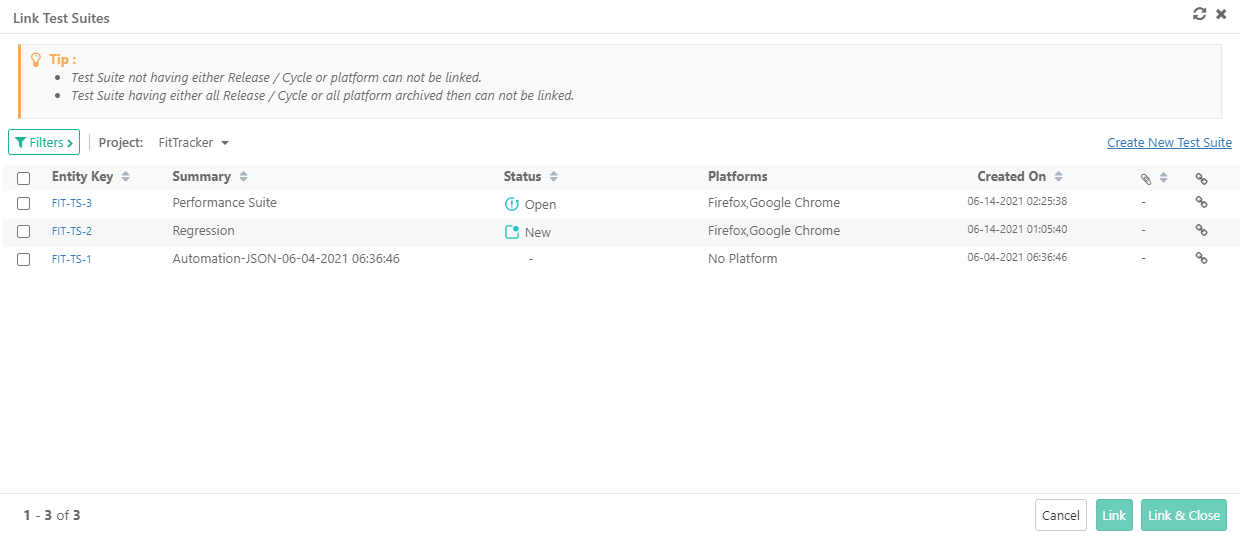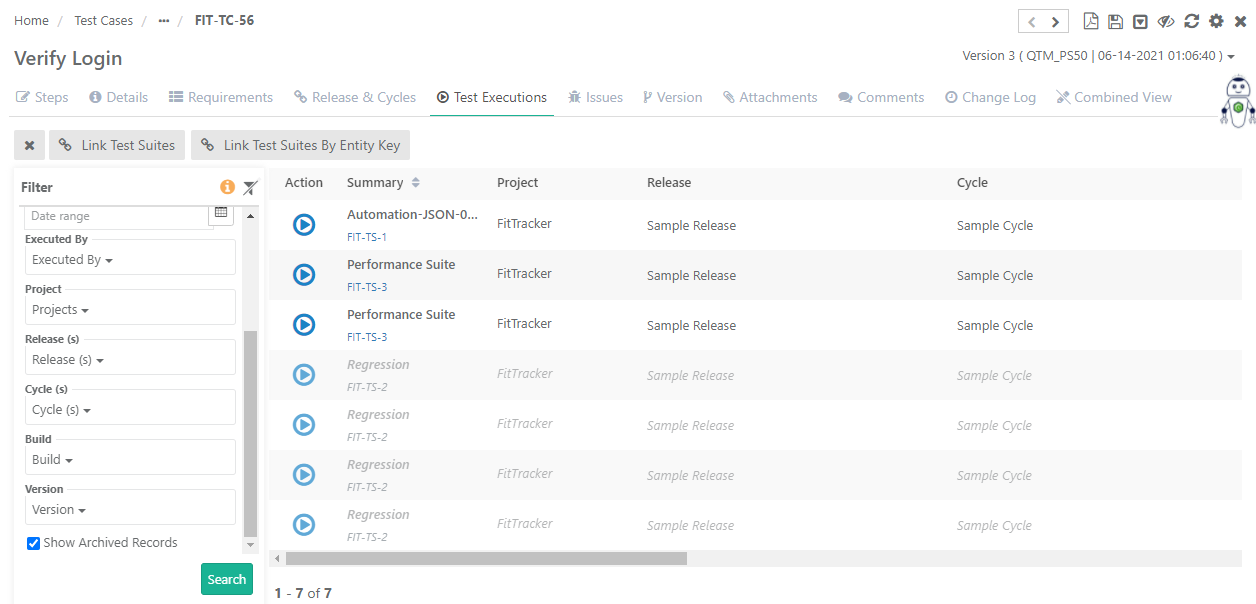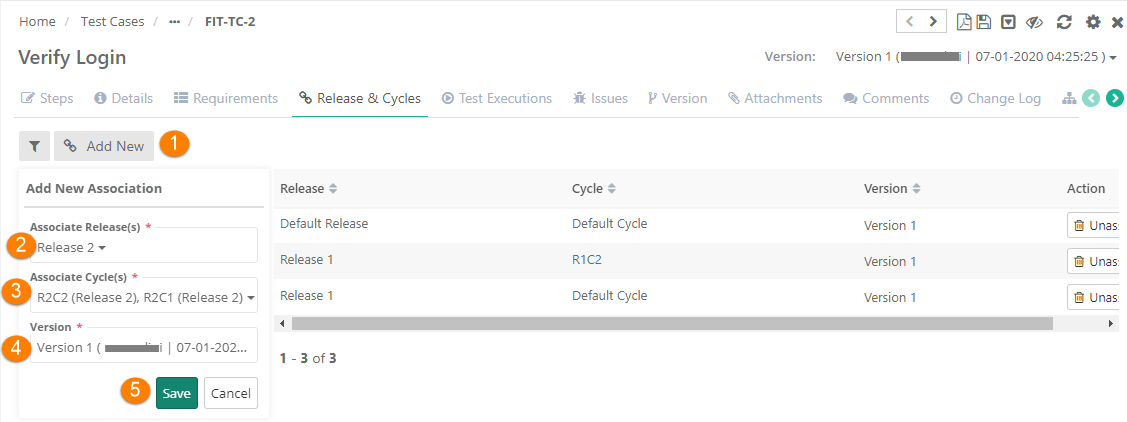| Table of Contents | ||
|---|---|---|
|
...
Show More Columns: The ability to add columns in the view. If there are other columns that you think important to display on the module grid apart from the default view, then you can just select those columns to add them to the view.
Hide Columns: The ability to remove a column from view. If you do not want to include columns of less important on the module grid view, then remove column selection to hide those columns on the view.
Users can show/hide the Testing Type field in the Test Case module. If users want to use their own UDF instead of this field, they can hide it. The setting is provided in the Manage Fields section of the Customization module. Refer to Manage Fields for more details.
Re-arrange: The ability to arrange the columns in a different order through drag and drop functionality.
...
Users can easily filter test assets by any system/custom fields on all module grids. It also helps users in carrying out bulk operations. Filters placed horizontally above the grid earlier, are now placed on the tree panel at left.
Testers can view details grid aligned with folder tree even when they are clicking a folder which is at the bottom.
Apply Filter
Users can apply basic as well as advanced filters to the records.
...
Note: To enable rich text editor, the Enable Rich Text parameter should be enabled for the Project (Projects > Project / Release / Cycle). Refer to Enable Rich Text Editor for more details.
...
Testing Type: You can see this field on the test case detail page once a test case is created. The field shows how the test case was created in QMetry: Manual or Automated. If a test case is created through UI or imported from Excel, then it is identified as a manual test case. Test Cases that are created through Automation APIs are identified as Automated test cases. The Testing Type field remains read-only.
User Defined Fields: If UDFs are added for the test case module, then they are displayed on the Create Test Case screen and Test Case Details screen.
...
As an alternate way, you can click on the Edit icon for the step that you want to edit.
The step section opens in the expanded view.
...
Once you are done with editing the test step, click Apply to save the changes.
...
Create a New Version of Test Case
If test case steps are added or edited in the test case, which is already executed, then it is recommended to save the test case with Save as New Version.
...
B. Open the test case detail page and click on the Create New Version icon on the header.
...
The next screen opens in editable mode.
...
If the above option is not selected, then on the Test Run screen the sync icon appears beside the current version of the test case. On the Test Execution screen, to execute the latest version of the test case, click on the sync button.
The confirmation message pops up confirming the reset of execution status. The synced version will not show previously linked issues.
...
If test steps were added in the latest version of the test case, then these test steps will also be added on the execution screen.
...
Note: QMetry allows you to use different versions of a test case for testing. Read more about it on the Managing Test Case Versions page.
Archiving a Test Case
All the versions of the test case should be archived to delete that particular test case.
Archiving Entire Test Case
...
To delete a test case, first you need to archive it. All the versions of the test case should be archived to delete that particular test case.
It is a two step process:
...
Deleting Entire Test Case
All the versions of the test case should be archived to delete that particular test case.
A. From Test Case detail page
...
Once the test case is archived, it looks like below.
...
The Delete icon now appears at the top right corner of the page.
...
The selected requirements are linked to the test case. The linked requirement records are shown on the lower grid pane.
...
If requirements from other project are linked, then the requirements show Entity Key of the corresponding project.
...
The requirements with mentioned keys get linked to the test case.
...
How to Unlink Requirements Linked to a Test Case
...
B. To unlink multiple requirements, select requirements you want to unlink from the test case and click on the Unlink Selected button.
...
Linking Test Suites to Test Cases
...
Open the Test Executions tab and Click on the Link Test Suites button. It opens Link Test Suites pop-up.
...
If you want to link test suites from multiple projects, then first select one project. Search records and link them before moving to other projects. For example, User A is in Project 1 and searches for some records and link them before moving to Project 2. Else, all the selection of Project 1 will be wiped off.
A. Linking a Single Test Suite: Click on the Link icon to link the individual test suite to the test case.
...
An execution/test run is archived when either Platform/Release/Cycle/Test Suite is archived. When a test suite, platform or Release/Cycle is archived, the test executions having such test suite/platform/release/cycles associated with them will be hidden on the Test Executions tab of the test case.
The Show Test Runs with Archived Platform(s)/Release(s)/Cycle(s)/Test Suite(s)Archived Records check box is provided on the Test Executions tab. To view the test runs which are archived either due to platforms/release/cycles, select the check box in the filter.
While import any change in the status of such archived test case executions will be ignored.
...
If test suites from other project are linked, then the test suites show Entity Key of the corresponding project.
...
Test Suites key will be ignored if relevant test suite with that key is not found.
If a single key is mentioned multiple times, it will be linked only once.
Archived test suites will be skipped from linking. Only unarchived version of entities will be linked.
Skip Duplicate Linkage is "On": If the test case is already linked with a test suite, then the linked test suite will be skipped. Only those test suites will be linked which are not yet linked with the test case version from where the linking is being performed.
Skip Duplicate Linkage is "Off": The test case version from where the test suite is being linked, that version will get linked to all the test suites.
Steps
1. Go to the Test Executions tab of the test case.
2. Click on the Link Test Suites By Entity Key button.
...
3. It opens the Link Test Suites pop-up. Mention comma separated Test Suite keys.
...
The Test Executions tab shows the last execution build for the test suite. It is useful when a QA Manager/Tester wants to see the latest Build against which the execution was done on 'Test Executions' tab of Test Case screen.
...
View Test Run Logs
...
Calculation of Execution Time of a test suite:
The Execution Time of a test suite is calculated based on the Estimate Time of all the test cases in that test suite.
...
Once the test suite is executed, the Remaining Time Is calculated of for all “Not Run” test cases. Any test case with “Failed” or “Blocked” status will also be considered as the work still remains on it.
...
The following example shows the calculation of both – Execution Time and Remaining Time.
...
Once the test case is added, the user wants to add it to a particular Scope - release and cycle. For the this reason, they edit the test case and associate new release and cycle to it.
Click on the Add New button to associate release and cycle with the test case. The drop-downs are enabled on the by clicking on the Add New button.
Select the release(s); the cycle list is prompted for the selected release.
Select the cycle(s).
Select the version of the entity to associate as you you can link releases and cycles to a particular version of the test case.
Click Save.
The associated release and cycle appears appear in the grid on the screen.
...
To remove the release and cycle association for the test case, click on the Unassociate button for the release and cycle combination.
...











